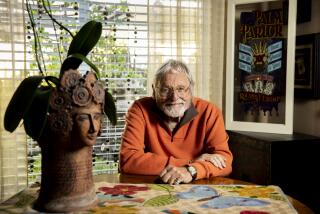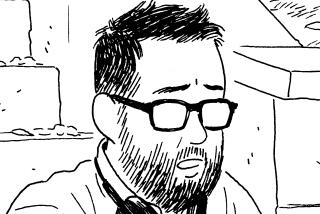A Riveting Look at a Compulsive Artist: ‘Crumb’ : Movie review: The film serves as an example of the way horrific family conditions can nurture an artistic sensibility.
As shocking yet haunting as a Diane Arbus photograph, disturbing because it is so unmistakably human, “Crumb” makes it difficult to look away. Not even Leo Tolstoy’s dictum that “Every unhappy family is unhappy in its own way” is adequate preparation for the unsettling personal dramas that unfold in this remarkable film.
Though Terry Zwigoff’s documentary begins as an examination of the art and career of the celebrated cartoonist R. (for Robert) Crumb, it is considerably more than that. Because it provides an intimate view of Crumb’s singular background, it ends up dealing with larger, more complex issues, from the impact of family in shaping personality to the concept of the artist as a messenger to society from a scathing personal hell.
Considered the key figure in the underground comic movement, Crumb is responsible for such outrageous creations as Mr. Natural, Fritz the Cat and the catch phrase “Keep on Truckin’.” In the view of Time magazine art critic Robert Hughes, his scabrous monsters of the id drawings make Crumb “the Breughel of the last half of the 20th Century,” and comparisons to Daumier and even Goya have not been lacking.
Though Crumb is often the centerpiece of his drawings, little has been known about him personally. Shy, bemused and seriously eccentric, a devotee of bow ties and old 78 records, Crumb is hardly eager to let the world interact with what he calls “the little guy that lives inside my brain.”
But documentarian Zwigoff, who worked on this film for six years, has known Crumb for 25 and even played alongside the artist in the Cheap Suit Serenaders, his old-timey string band. Only an intimate of such long standing could have gotten this kind of privileged view of a subject’s life, and only a talented and experienced filmmaker, which Zwigoff is as well, would have been able to handle material this unnerving.
Unwilling to drive, uneasy with people, described by his wife, Aline, as someone who’d “rather be a brain in a jar than have a body,” Crumb is initially presented in a typical mode of ironic self-disgust. “If I don’t get to draw, I feel suicidal; if I do, I feel suicidal, too,” he says, paralleling his general belief that “Words fail me, and pictures aren’t much better.”
In fact Crumb is an engaging monologuist when he gets going, willing to reveal more about his tangled sex life (with his ex-wife and girlfriends providing corroboration) than many people may want to hear. And his graphic, straight-from-the-unconscious artwork, which Crumb says began to flower after a particularly weird LSD experience, can be so unapologetically misogynistic that Zwigoff appropriately devotes time to feminist critics of his sensibility.
But the biggest shock of “Crumb” is not what he draws but finding out that this man is the most normal, functional member of his family. The artist is one of five children of a violent ex-Marine who wrote and taught on “Training People Effectively” while physically terrorizing both his trio of sons and their amphetamine-abusing mother. (Crumb’s two sisters refused to cooperate with the film and are not interviewed.)
Robert’s oldest brother, Charles, got the brunt of the physical punishment and his presence on film has an unusually disturbing quality. Witty, painfully sad, someone who is on easy terms with Kant, Hegel and the great 19th-Century novelists, Charles has lived with his mother in their shambles of a home since high school and is only tenuously linked with reality.
As far as artistic expression in the Crumb family, however, Charles was the acknowledged trailblazer. He was the first of the children to become interested in comics, the one who insisted that Robert draw and get good at it. The film shows him dependent on tranquilizers and anti-depressants, too detached from the human race to ever so much as set foot outside the front door.
Equally arresting, but not quite so poignant, is brother Max, who sleeps on a bed of nails in a San Francisco flophouse, remembers every childhood slight and performs off-putting yoga cleansing rituals for the benefit of the camera.
Taken together, the tale of these three brothers functions as a textbook example of the way horrific family conditions can nurture an artistic sensibility. Resistant to fame, congenitally unable to sell out, Crumb draws because he has to, because it is the only way he can find to make the strain and madness of his upbringing manageable.
Last glimpsed about to move his family to France because it’s “slightly less evil than the United States,” Crumb also says at one point that he doesn’t consider himself an exciting subject for a movie. Maybe not exciting, but when it comes to unflinching, riveting looks at a compulsive artist who can’t be other than who he is, nothing comes close to “Crumb.”
* MPAA rating: R, for graphic, sex-related cartoons, and for language. Times guidelines: depiction of extremely disturbing family situations.
(BEGIN TEXT OF INFOBOX / INFOGRAPHIC)
‘Crumb’
David Lynch presentation, released by Sony Pictures Classics. Director Terry Zwigoff. Producers Lynn O’Donnell, Terry Zwigoff. Executive producers Lawrence Wilkinson, Albert Berger, Lianne Halfon. Co-producer Neal Halfon. Cinematographer Maryse Alberti. Editor Victor Livingston. Music arranged by David Boeddinghaus. Sound Scott Breindel. Running time: 1 hour, 59 minutes.
* Limited release, playing Nuart Theater, 11272 Santa Monica Blvd., West Los Angeles. (310) 478-6379.
More to Read
Only good movies
Get the Indie Focus newsletter, Mark Olsen's weekly guide to the world of cinema.
You may occasionally receive promotional content from the Los Angeles Times.











